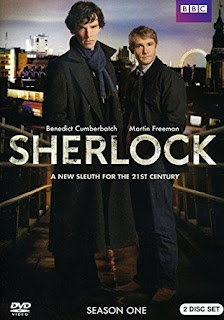While I'm generally against most remakes and reimagination projects given the seeming lack of creativity, it's hard to apply the same standards to much older works of this nature. It's annoying when you remake something that came out within the last decade but when you're talking about stories that are about a century old or more, well, then I don't feel quite as wrong about it. As long as it is done well, it provides a new opportunity for younger audiences to get exposed to such classic tales in a (hopefully) meaningful manner. Greater exposure and awareness is key to keeping such stories alive.
This particular project was quite the delightful surprise, but then most shows coming from the UK tend to catch me by surprise, period. Still, I'm glad that this particular project was put into motion with such promising results.
 Image via WikipediaSherlock is a BBC (mini?) series created by Steven Moffat and Mark Gatiss. The "season" only consisted of three 90-minute episodes that are somewhat modern adaptations of classic Sherlock stories.
Image via WikipediaSherlock is a BBC (mini?) series created by Steven Moffat and Mark Gatiss. The "season" only consisted of three 90-minute episodes that are somewhat modern adaptations of classic Sherlock stories.The series begins similar to how the original stories went - with Dr. John Watson (Martin Freeman) trying to start a new life for himself after getting injured in Afghanistan. He eventually gets introduced to Sherlock Holmes (Benedict Cumberbatch) as a potential flatmate and the two end up sharing rooms at 221 Baker Street under the care of Mrs. Hudson. As Watson tries to get a job at a local clinc, he discovers Sherlocks eccentric profession of being a consulting detective for the local police.
True enough, the two receive a visit from Detective Inspector Lestrade (Rupert Graves) who wishes to get Sherlock's help with the case. There have been a series of strange suicides that could very well be a case of serial murders. The most recent victim is a woman garbed in a shocking shade of pink who managed to claw the word "Rache" on the floor before she died. In the course of the series Sherlock address three different cases - A Study in Pink, The Blind Banker and The Great Game, all documented on Watson's blog.
The series did have a bit of a Doctor Who feel to things because of Moffat, but now one could argue that the relationship between the Doctor and Sherlock may be rather chicken and egg, in a manner of speaking. Both men are known to be highly intelligent, rather eccentric, scarily brilliant and with a general preference of using wit over muscle in terms of resolving problems. And Cumberbatch did an excellent job of bringing Holmes to life in a manner that paid homage to previous Sherlock Holmes depictions while still bringing a fresh spin to things.
It was generally nice how they tried to capture Holmes' skills in observation and analysis although my partner and I agree that it would have been more fun had we followed his stream of consciousness more. The usual zoom in on clues alone is a bit too old hat (as in the CSI hat to be specific). It would have been a lot more interesting and somehow a better depicition of his hyperfast intelligence at work would have involved lots of different ideas flashing in his mind at one time. Then we'd get to follow one path or another as he discards less probable ideas and focus on the key paths.
The use of modern technology as opposed to the old detective stuff is a bit of a mixed bag for me. At times it's novel and quite innovative - definitely something I'd imagine a modern Sherlock to do. Then there are those quirky times when the technology seems a bit forced and bordering on science fiction or maybe just fantasy, but these passes aren't too bad and you should survive well enough despite them.
And just because each episode is 90 minutes long, don't make the mistake of thinking that they're slow or overly drawn out. On the contrary, there's a heck of a lot going on every time. It speaks of rather good writing behind everything and I'm looking forward how they'll continue to develop the characters in the next season.
Sherlock is a great way of approaching a classic character in a modern context and yet another example of why British TV is awesome. It gets 5 gay innuendos between Sherlock and Watson out of a possible 5.

No comments:
Post a Comment